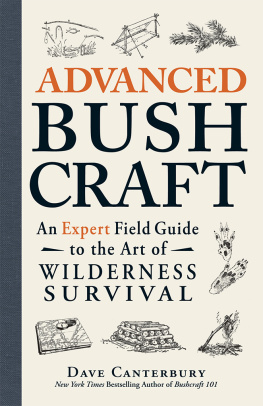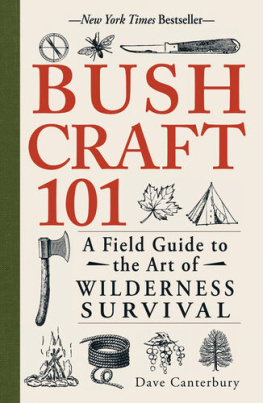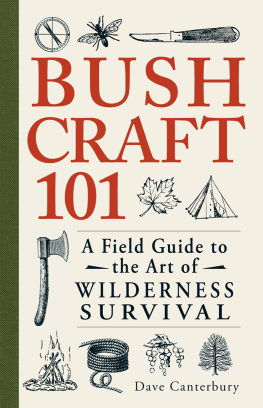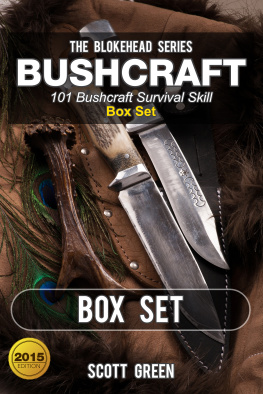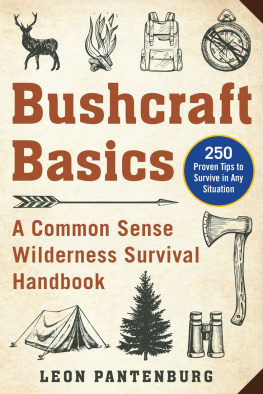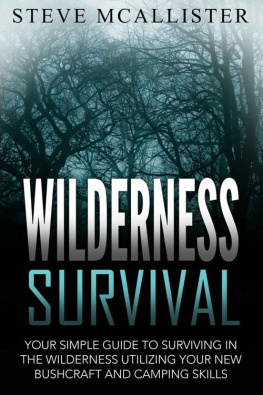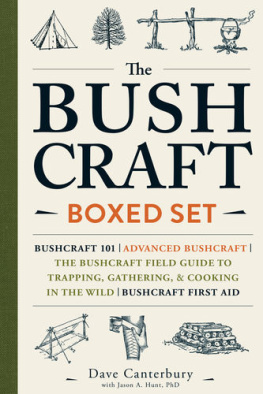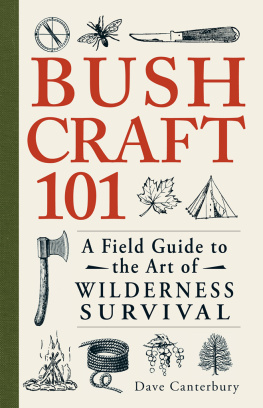Contents
Guide
ADVANCED
BUSHCRAFT
An Expert Field Guide to the Art of
WILDERNESS SURVIVAL
D AVE C ANTERBURY
New York Times Bestselling Author of Bushcraft 101

Avon, Massachusetts
DEDICATION
A book should be dedicated not only to those from whom the knowledge to write it was secured but also for those who make it possible. My wife Iris has made it possible for me to live my dream of teaching outdoor skills to others through many outlets from social media to television as well as the written word. She has faithfully stood by me through the countless hours of training and evolving, through the years of practice and experimental dirt time. She has always supported me and given of herself to help fulfill my dreams in this and any endeavor, and so to her I dedicate this book. I would also like to thank my father for the examples in work ethic he taught me my entire life and still to this day. While we strive to chase our dreams in life we must always remember the road to success is paved by the work you put into it. I have learned this lesson well from his teachings.
As for the contents of this book, the list is exhaustive to say the least: men forgotten in history of both American and European descent, native peoples of the early Americas who passed their knowledge to us along the way in the early days of exploration, and many modern role models who continue to this day to pass on the knowledge they have in an effort to establish these lessons for generations to come. The writings of authors past such as Daniel Beard, Ernest Thompson Seton, Hyatt Verrill, William Hamilton Gibson, George Washington Sears, Horace Kephart, Mors Kochanski, and many others come to mind quickly as shining examples of men from whom I have taken a wealth of knowledge to further my learning.
CONTENTS
Introduction
This is the second in what I hope will eventually be a series of books on the art of bushcraft, or wilderness survival. Bushcraft 101 was a primer on the skills necessary for a short stay in the wilderness. These skills include building an effective kit, selecting and managing equipment, developing supplies, and setting up camp. Much of our study was on connecting with nature and learning the basics for preparing ourselves for any climate and situation. In Bushcraft 101 we learned that many things can be accomplished with our own knowledge and a few tools. We talked about the kinds of things you need for a short stay outdoors. In Advanced Bushcraft, we will take these skills to the next level and prepare you for a lengthy stay in the wilderness.
The most important thing to understand before embarking on a long journey outdoors is resource management. You can only carry so much on your backespecially if you plan to hike or walk for a long distance. Since you cannot bring a truckload of supplies with you, you need to understand the limitations of your kit and how to maximize the environment and its resources to overcome these limitations. You must discern between which supplies you should carry with you and which can be harvested or manufactured on the trail. This requires keen competency in manufacturing versatile tools, starting fires with minimal forms of ignition, developing semipermanent shelter, and establishing an effective trapping campaign for food.
Long-term sustainability will require a lot of improvisation. Part of self-reliance is learning to deal with the unexpected. Tools will break, weather will turn, and food sources may be hard to find. You need to be confident enough in your skills that you can fix the handle on your axe if it breaks, and, when you do find that game, preserve the leftovers so the meat will last you a good while. If you understand advanced skills such as building watercraft and making containers for water and other supplies, you will be able to negotiate the climate and your environment for a long time. Dont underestimate the value of comfort. If you are going to be out for a long time, a good nights sleep is critical. Knowing how to assemble a sleep system by fashioning pillows and building raised beds will make a tremendous difference in your ability to be successful.
We will also take a close look at advanced wilderness skills such as weaving for additional clothing and shelter implements and net making to help secure fish and other water animals as additional sources of protein. Managing cordage and manufacturing additional rope out of natural materials will be a critical component of these practices.
Understanding the natural world will be absolutely essential to your ability to smooth it in the wilderness. It is your repository for food, fire-making supplies, and health resources, and it furnishes you a place and the materials to build your shelter. Being able to recognize the components of a tree, from the properties of its wood to the medicinal values of its outer leaves and bark, will allow you to take advantage of your environments largest resource. Recognizing animals and their behavioral patterns is what will help you outthink them when youre hunting. Even the clouds in the sky can provide you with a weather forecast, which you can use to make adjustments to your camp and shelter. Remember to practice! Use short camping trips as an opportunity to hone these skills and experiment with life when you are carrying only a few things. If certain things dont work out right away, thats okay! Head home, rest up, and try it again on your next trip.
This handbook is intended for the woodsman who knows basic primitive survival skills and is looking to advance his knowledge and abilities for a longer stay in the wildernessa few days or even an entire trapping campaign season. These skills will also help you in the event you become lost or stranded without resources. Mostly, though, these give you a chance to envelop yourself in nature as our ancestors before us did. As George Washington Sears (Nessmuk) wrote, We seek the forest for adventure and a free, open-air hunters life, for a time at least. Advanced Bushcraft is the handbook for your adventure. Use it to survive and thrive in the natural world.
Dave Canterbury
Chapter 1
BUILDING YOUR KIT
The doctorate in woodsy knowledge can only be taught by Mother Nature in the classroom of the outdoors. Many can train you but only experience can teach you.
D AVE C ANTERBURY
Bushcraft is the practice of using wilderness skills to survive and thrive in the natural world. In Advanced Bushcraft, you will hone those skills and push beyond the mentality of immediate needs. You will learn to think about the totality of your skills and supplies and how they work together to ensure long-term sustainability. In other words, its not just about packing resources. Its about thinking ahead to the kinds of skills it takes to refurbish your resources or create more if necessary. You will learn that it takes a lot of skills but only a few tools to become self-reliant. With just a handful of the right implements you can manufacture most of the things you need, from a permanent shelter to clothing, hunting gear, weapons, and even medicine.
PLAN THE SCOPE OF YOUR TRIP
Short-term trips in the woods are great opportunities to practice skills and take chances with a smaller kit. Traveling with fewer implements requires a lot of improvisation with tools and supplies, and its okay if things do not go perfectly. On a short jaunt, whether it is a day or a week, it does not matter much if your shelter is uncomfortable or if your trapping campaign is not overly successful. Use short-term trips as opportunities for learning and know that if something does not turn out quite right, you can practice again next time to make it better.

